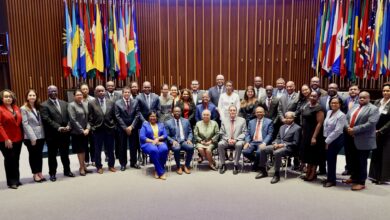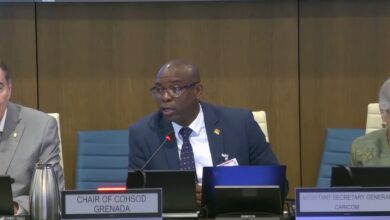As the Caribbean public health sector ramps up its response to the Zika virus in the Region, officials are strongly advising the adoption of personal protective measures to avoid mosquito bites and the reduction of mosquito breeding grounds.
The Caribbean Public Health Agency (CARPHA) issued the advice on Monday at a press conference held to address the presence of the Zika virus in the Caribbean.
Zika is a new disease that is spread by the Aedes aegypti mosquito, which also transmits chikungunya, dengue and yellow fever.
So far, there are 22 countries and jurisdictions in the Americas with Zika virus cases, including four CARPHA member states – Guyana, Barbados, Haiti and Suriname. Zika’s presence in the Caribbean is rapidly evolving with “good conditions for spread in the Caribbean”, CARPHA said, pointing out that “we have abundant mosquitoes; a lot of travel and movement, and a completely susceptible population”.
Given the nature of the Zika, the unusual increases in two conditions associated with the virus – microcephaly and Guillain-Barre Syndrome – and the fact that there is no specific treatment, vaccine or preventive drug, CARPHA has underscored the necessity to avoid contact with mosquitoes.
For pregnant women and women intending pregnancy in areas where Zika virus is circulating, it is recommended to take extra precautions to avoid contact with the vector (repellent, screens, long pants and sleeves) and to be extra vigilant to reduce any breeding sites in and around the house.
The issue of mosquito or vector control therefore plays an extremely important role and is not just the responsibility of government. All of us have a responsibility to reduce/eliminate breeding sites. Health facilities, hotels and tourism facilities, ports of entry, and schools are among the key sites for ensuring mosquito control.
… this a new disease and it is not clear just how it will manifest in our populations. I must also note that mosquito control is failing; and that we must do better. The situation we experienced with ChikV and now the threat of Zika, underline that we need to get much more serious,” Dr. James Hospedales, Executive Director of CARPHA said.
The media engagement covered various aspects of the disease including how its spread is monitored and the key role of the laboratory; the control of the mosquito; tourism and travel implications; and ethical issues. Dr. Hospedales led the team of experts that included Dr. Karen Polson-Edwards, Senior Technical Officer, Vector-Borne and Neglected Tropical Diseases; Dr. Lisa Indar, Programme Manager, Tourism and Health Programme; Dr. Derrick Aarons, Ethicist; and Dr Joy St. John, Director, Surveillance, Disease Prevention and Control.
Please follow the links to the statements issued at the Press Conference this morning:






